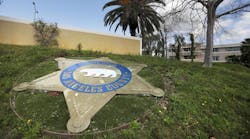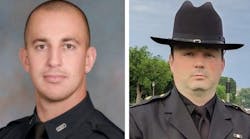Law enforcement is becoming more and more clued-in when it comes to both technology and getting the most out of private-sector relationships and nothing could be smarter. One excellent example of turning to tech to catch a thief (not to mention murderers, rapists, robbers, terrorists, etc.) is the smart partnership the FBI has made with Clear Channel Outdoor.
Clear Channel Outdoor, a division of Clear Channel Communications, operates a series of digital billboards across the country. The company also has digital signs in airports, at mass transit locations, in malls — just about anywhere such a sign can go.
But the massive billboards are what interested the FBI. Or at least, FBI community outreach specialist Natosha Gale, headquartered in Philadelphia.
According to the agency, Gale and Barbara Bridge, a Clear Channel Outdoor executive, struck up a conversation that eventually led to using digital billboards to help catch criminals in the Philadelphia area.
The billboards showed the faces and other information on persons wanted in connection with various area crimes. One of the crimes the billboards publicized the tragic murder of a Philadelphia police officer, Charles Cassidy, who died on October 31, 2007, responding to a robbery call. The FBI says that it put 11 of its most-wanted fugitives in the Philly area on the billboards and two were captured. Not bad. Not bad at all.
This is what happens when law enforcement and the private sector join forces. Not only does it give agencies a deeper reach into a community, but it also helps develop a proprietary relationship among businesses and civilians in the communities in which they live and work. And that's good for police-community relations.
The Clear Channel collaboration has proven so successful that the FBI is expanding its use of digital billboards into 19 additional major cities: Akron, Albuquerque, Atlanta, Chicago, Cleveland, Columbus, Des Moines, El Paso, Indianapolis, Las Vegas, Los Angeles, Memphis, Miami, Milwaukee, Minneapolis, Newark, Orlando, Tampa and Wichita. This is a great idea at which local law enforcement agencies should take a hard look. Here are a few more ideas:
- Tweak the old wanted posters by splashing crooks' names and faces everywhere. Open a dialogue with local access cable, alternative publications that cater to specialized readerships, and places like malls and large stores. The FBI's approach in Philadelphia can be a template for taking your information to the citizens in new and innovative ways.
- Talk to local civic organizations and the Chamber of Commerce and let them know your needs. Ask for their input. Most business people want to help because they know that keeping criminals out of circulation is one way to make themselves and their customers less vulnerable. Some cities regularly meet with businesses to hear their concerns. Why not also communicate your needs? The private sector may just have the solution to your dilemma.
- One savvy department takes grainy surveillance videotape to a store with high-tech equipment and enlists the business' help in making subjects on the tapes easier to see and identify. What equipment and capabilities does the civilian community you serve have that you don't?
- Other departments have teamed with like-minded agencies, as well as business and community leaders to tackle the source of many crimes and police calls — like homelessness. Take a look at Santa Monica's Homeless Liaison Program, for example, which works to remove some of the city's most frequently encountered homeless from the streets and into a safe, non-threatening environment. A win-win for everyone.
The next big idea is simply waiting for you to find it. Make sure your department has both personnel who keep up with technical advances as well as officers who interact often and well with the community. And never miss a chance to turn someone else's assets into your advantage.
A 12-year veteran of police work, Carole Moore has served in patrol, forensics, crime prevention and criminal investigations, and has extensive training in many law enforcement disciplines. She welcomes comments at [email protected].


